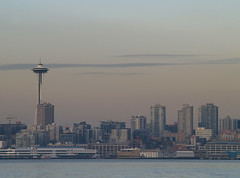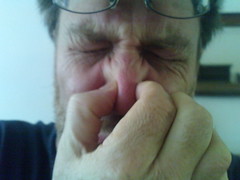Today at 5 p.m. is the end of the “scoping period” to submit written concerns about the proposal to run new coal trains through South Seattle near Beacon Hill from the Gateway Pacific Terminal at Cherry Point. Comments submitted in this scoping period will help in defining the impacts to be included in the project’s Environmental Impact Statement (EIS).
Neighbor Mira Latoszek wrote this commentary letter:
Dear Army Corps of Engineers, Department of Ecology and Whatcom County Council:
I am a resident of the North Beacon Hill neighborhood of south Seattle. I live directly to the east of the train tracks that would carry an increased number of trains to and from the Gateway Pacific Terminal at Cherry Point. Beacon Hill is a large Seattle neighborhood of approximately 40,000 people. I am asking that you study impacts associated with the increase of trains at crossings in south Seattle, specifically at Spokane St., Lander St. and Holgate St. These are major intersections connecting Beacon Hill to the Industrial District, the Port of Seattle, the waterfront, and downtown.
I, along with many of my neighbors on Beacon Hill, are dependent on goods and services from the SODO area which would be directly affected by the increase of trains at these crossings. In addition, many of us work in an around the SODO area and the southern end of downtown Seattle, including several owners of small businesses. I travel by car and bike through these intersections on a daily basis to get to my job on Second Avenue in Pioneer Square. Being able to get across the train tracks quickly and safely is an important part of my life.
According to the applicant’s Project Information Document (Feb. 2011), full build out of the coal export facility would result in nine full northbound trains along this line a day, which equates to 18 train trips a day; however, nothing in the project materials specifies a maximum. The 18 trains per day round trip could be increased if export capacity of the proposed port were expanded in the future. The current port proposal occupies 350 acres of a 1,000-acre site. Each train may be over 1.5 miles long, which at 50 miles per hour would mean approximately 3-4 minutes between train approach warning/gate closure and ultimate gate opening. At 35 miles per hour it could take approximately 6-7 minutes to clear a crossing as the siding near
this area is rated for 35 mph. The 18 trains per day would equate to approximately one additional coal train every 1.3 hours, all day long, in addition to existing train traffic. That would translate to an addition of approximately two hours per day that vehicles and people would not be able to cross these major intersections in south Seattle.Continue reading Open letter: Coal train impacts need to be studied


